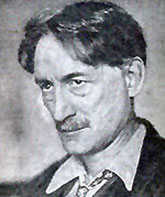Henri Barbusse
Critique • Works

Born
1873
Died
1935
Publications
Novels, journalism, poetry
Writing language
French
Literature
• Under Fire (1916)
Novels
• Under Fire (1916)
French Literature
• The Inferno (1908)
• Under Fire (1916)
To hell and onward
For someone who wrote one of the greatest novels to come out of the First World War and is often credited as the writer who turned French literature around in the twentieth century, Henri Barbusse is surprisingly little known in much of the world today.
Could this be because of his communist politics or because he lived out his late years in the Soviet Union?
Barbusse was born outside Paris and joined the artistic circles of that city, producing mainly poetry and journalism at first. His novel L'enfer (1908, translated as Inferno or Hell) however sparked a scandal as an account of voyeurism when it was released in English. In the intensely realistic story, a young man in a Paris boardinghouse spies on his neighbours through a hole in his bedroom wall, witnessing marriage, adultery, birth, death, lesbianism and all other human behaviours. It became one of France's most widely novels and is credited as introducing a new level of realism in literature, to be developed up by such writers as James Joyce.
Le feu (1916, translated as Under Fire, the Story of a Squad) was his depiction of the horrendous carnage and a moving portrait of the men who suffered it together. One of the most realistic and, at the same time, poetic accounts of war ever written, it won the Prix Goncourt, France's highest literary honour.
The war turned Barbusse first into a pacifist and then into a communist, as he joined the newly formed French Communist Party in 1923. In this period he wrote very political novels, including Clarté (1919, translated as Light), Les Enchainements (1924, Chains) and Le Judas of Jésus (1927, The Judas of Jesus) in which Christ is portrayed as an early revolutionary.
He became literary editor of the Communist Party's daily newspaper L’Humanité in 1926 and in 1928 he started the weekly communist paper Monde, which he edited until his death in 1935. He also wrote several nonfiction books about Russia.
— Eric
Critique • Works

